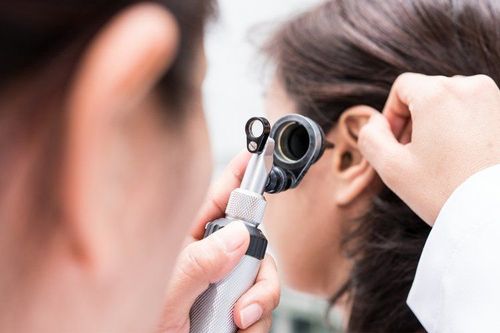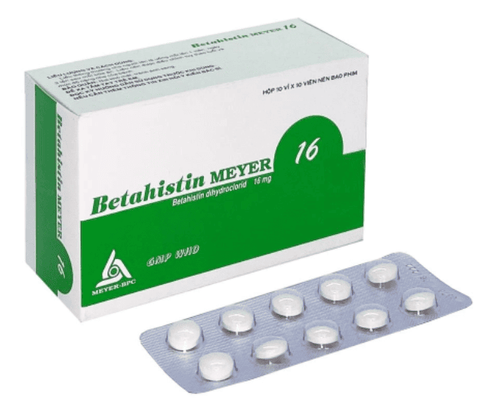This is an automatically translated article.
The article was professionally consulted by Dr. CCII Nguyen Van Thai - Department of Otolaryngology and Head and Neck Surgery, Vinmec Danang International General Hospital.Sudden deafness can happen suddenly or happen within hours. It is still not clear exactly what causes sudden hearing loss, and medical experts around the world are looking for ways to better understand this phenomenon. The effects of sudden deafness range from mild to severe depending on other health factors and have the potential to become permanent deafness. Sudden hearing loss can also occur along with tinnitus.
1. General features of sudden deafness
Sudden Hearing Loss is a sudden and rapid unexplained hearing loss, the patient may be deaf for a while or for a few days. Sudden deafness occurs due to problems with the sensory organs of the inner ear. Sudden deafness usually occurs in only one ear.People with sudden deafness usually discover hearing loss when they wake up in the morning, there are people who discover sudden hearing loss while trying to hear something, such as while using the phone, even There are even cases where the patient hears a humming noise just before their hearing disappears. People with sudden deafness may also notice one or more symptoms: a feeling of fullness in the ears, dizziness and/or ringing in the ears..
Sometimes people with sudden deafness don't see a doctor because they think they Hearing loss is caused by allergies, sinus infections, excessive earwax, or other common conditions. Sudden deafness is an ENT emergency and requires immediate treatment.
Although sudden deafness can restore partial or complete hearing spontaneously within one to two weeks, delayed diagnosis and treatment of sudden deafness can affect treatment outcome. In contrast, if the patient is treated promptly, it will significantly increase the likelihood of hearing recovery.
Epidemiologically, sudden deafness occurs at a rate of 1 to 6 people per 5,000 per year, but in reality can be much higher because sudden deafness often goes undiagnosed.

2. Causes of sudden deafness
There are many disorders affecting the ear that can cause sudden deafness but only 10% of people diagnosed with sudden deafness have an identifiable cause, such as:
Infection. Head injury. Autoimmune disease. Exposure to certain cancer medications or severe infections. Blood circulation problems. Neurological disorders, such as multiple sclerosis. Inner ear disorders, such as Ménière's disease.
3. Sudden deafness diagnosis
In patients with sudden symptoms of deafness, the doctor will first rule out hearing loss due to an obstruction in the outer ear, such as fluid or earwax. For sudden deafness with no apparent cause, it can be determined by monophonic audiometry (English name is Pure Tone Audiometry) within a few days of the onset of symptoms to identify any hearing loss. sensorineural hearing loss.
With monophonic audiometry, the doctor can measure how loud different frequencies or pitches are required before a person can hear. A sign of sudden deafness can be a loss of at least 30 decibels (decibel is a measure of sound intensity) in three connected frequencies within 72 hours.
If a person is diagnosed with sudden deafness, the doctor will likely order additional tests, which may include blood tests, imaging (usually magnetic resonance imaging or MRI) and blood tests. balance tests.
4. How to deal with sudden deafness?

To treat sudden deafness, especially when the cause is unknown, the most common method today is the use of corticosteroid drugs. In the past, steroids were given in injectable or oral form. In 2011, a clinical trial supported by the National Institute of Deafness and Other Communication Disorders (NIDCD) found that intratympanic injections were as effective as oral steroids.
Steroids should be used as soon as possible for best effect and may even be recommended before the results of tests to find the cause. If treatment is delayed for more than two to four weeks, deafness is less likely to be reversed or reduced or permanently lost.
Additional treatments may be needed if your doctor finds a cause for sudden deafness. Example: If sudden deafness is caused by an infection, your doctor may prescribe antibiotics. If the patient is already taking an ototoxic drug, it is recommended that the patient be switched to another medication. If an autoimmune condition causes your immune system to attack your inner ear, your doctor may prescribe medications that suppress the immune system.
If hearing loss is severe, does not respond to treatment and/or occurs in both ears, your doctor may recommend hearing aids (to amplify sound) or even receive implants cochlear implant (to directly stimulate the auditory connections in the ear that go to the brain).
Currently, at Vinmec International General Hospital, there is a service of monophonic audiometry and tympanometry. This is an objective method that can be used for uncooperative cases, especially for young children. Steps to perform a hearing test with a new, good device: KARNSTORCH (imported from Germany).
Check the machine Ear examination, if there is earwax, give it away. Choose the right earplug. Instruct the patient to sit still when measuring, do not raise hands, do not talk. Turn on the device, put the probe in the ear canal, when the green light indicates that the probe is in the correct position, take the measurement according to the settings of the device. Measure each ear individually for the most accurate results.
Please dial HOTLINE for more information or register for an appointment HERE. Download MyVinmec app to make appointments faster and to manage your bookings easily.
Article reference source: Webmd.com; Hear.com; Nidcd.nih.gov













